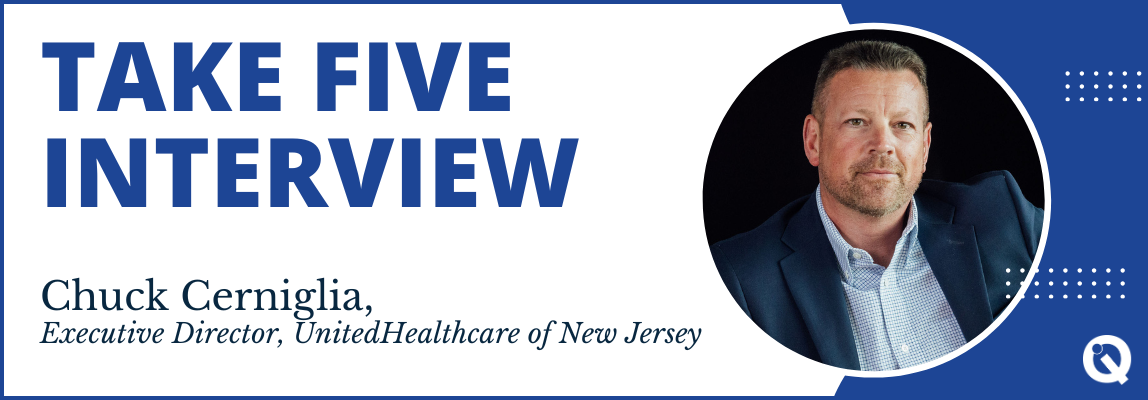Chuck Cerniglia, Executive Director, UnitedHealthcare of New Jersey. UnitedHealthcare and UnitedHealthcare Community Plan of New Jersey are members of the Quality Institute’s Plan Council.
The Quality Institute recently publicly shared its top health care policy priorities for New Jersey with the two Gubernatorial candidates. From UnitedHealthcare’s perspective, what is the most pressing health care issue or opportunity you would want the next administration to focus on?
We are working closely with stakeholders across the health system to help expand access to behavioral health services, especially in underserved communities. Virtual care can be a key part of that solution. The bottom line is that we want to see a health care system that’s more affordable and accessible for New Jerseyans.
UnitedHealthcare is deeply committed to helping people live healthier lives. That starts with helping New Jersey residents access affordable, quality care, regardless of where they live, their income level, or background.
We also support policies that promote value-based care, digital health adoption, and preventive services and more. Preventive care can improve treatment outcomes and reduce health care costs by catching health issues early — before they become more difficult and expensive to treat.
What is a “level-funded plan,” and why did UnitedHealthcare of New Jersey decide to offer this type of health benefits plan to New Jersey employers?
A level-funded plan blends the predictability of a fully insured plan with the potential savings of a self-funded one. Employers pay a fixed monthly amount that covers claims, stop-loss insurance, and administrative fees. It’s like a self-funded plan, but it gives you the flexibility of a fixed monthly amount, so you know exactly what you’re going to pay every month. What makes this model attractive is that if claims come in lower than anticipated, your plan may receive a refund — essentially getting money back at the end of the year.
That’s a significant draw for small and mid-size businesses looking to manage their health care costs. At UnitedHealthcare, we offer these plans to employers with two to 99 employees, with especially strong adoption in the two–50 space. Level-funded plans give employers clarity on what they’ll owe each month, while also providing the upside of a potential refund.
These plans include broad access to UnitedHealthcare’s national Choice Plus network and local Oxford network, along with integrated wellness programs and tools to help employers support their employees’ health.
How do you see technology-based decision-making tools being used to support individuals and employers in choosing plans, providers, and facilities — and better managing their health?
Technology is transforming the way people engage with health care. People are increasingly comfortable using telehealth for everything from minor illnesses like colds to behavioral health visits.
We’ve built platforms like the UnitedHealthcare app and myuhc.com that empower members to check claims, manage their health savings accounts, pull up ID cards, look up network providers, schedule virtual visits, and more. Our app can save you a phone call to customer service in many situations.
We plan to make more than 400 digital enhancements in the UHC app this year, the most recent of which is called Smart Choice, an improved provider search experience.
Smart Choice is an easy-to-use, enhanced provider search capability designed to improve navigation to high value, lower cost providers while taking into account each member’s unique benefits and personal preferences. Smart Choice promotes comparison shopping for care and empowers members to choose the provider that best meets their individual needs and health journey.
Do you see AI having a role in improving either the cost or quality of health care and insurance in the future?
Absolutely. First, I should note that we are focused on how AI can be used responsibly and safely to improve health care. One way we do that is by prioritizing human control of the decision-making process. That being said, AI can help simplify health care and reduce administrative burden, among other benefits.
At UnitedHealthcare, AI and advanced tech more broadly can help members find and coordinate care more easily and even personalize their benefits experience. One practical example: if a member forgets to fill a prescription, we can flag that in real time and alert customer service or care teams. That can help prevent disruptions in treatment before they happen. AI also helps our clinicians by automating administrative tasks — like summarizing doctor’s notes or generating visit summaries — which allows them to spend more time focusing on patient care.
Even internally, AI helps us be more efficient. But more importantly, it’s being used to reduce friction, anticipate problems, and improve outcomes across the entire health care journey.
Finally, beyond your professional life, can you share an experience that shaped who you are today?
One of the most defining experiences of my life was serving in the U.S. Army for four years. That time taught me a great deal about discipline, teamwork, and the importance of following through. One of my biggest takeaways — something I still tell my kids — is: don’t procrastinate. If something needs to get done, get it done. Waiting until the last minute only creates stress and usually lowers the quality of the result.
More importantly, the Army taught me how to work with people who have different communication styles, backgrounds, and ways of thinking. You’re all working toward the same goal, and learning to collaborate under pressure has helped shape how I lead teams today.

